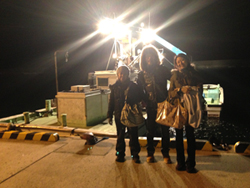February and March is spring break at GENV. Students head off to intense 2 month internships, others hit the libraries 24/7 to focus on thesis writing, and others join professors on field study trips.
Students in Prof. McDonald’s research office travelled to western Japan for a week in March 2013 to carry out interviews with farmers, fisher, local government offices and researchers iin Noto peninsula and Hegura Island, an area designated as a UN FAO Globally Important Agricultural Heritage System (GIAHS
http://www.giahs.org) in June 2011.

Students will be incorporating their field findings with thesis writing as part of their research related to developing integrated environmental policies for agriculture and fisheries for rural communities in Asia and Latin America. Another question guiding students is how global policy initiatives and local policy and community actions interact in today’s global world.
Looking at policy implementation, potentials and limitations from the perspective of famers and fishers, the targets of policy initiatives, is key in getting students to think about policy relevance and efficacy, and community empowerment. In addition to round table discussions with community leaders, government officials, with notebooks and cameras in hand, students headed outdoors for interviews with farmers preparing the rice terraces for the spring planting season and went out to sea with fishers in the dark of morning at 3 am (see photo) . Experiential learning and talking directly to people in their daily environs are all part of going deep into the field to gain knowledge and perspective as reference not only for thesis writing but also for future careers related to environmental policy.

 Students will be incorporating their field findings with thesis writing as part of their research related to developing integrated environmental policies for agriculture and fisheries for rural communities in Asia and Latin America. Another question guiding students is how global policy initiatives and local policy and community actions interact in today’s global world.
Looking at policy implementation, potentials and limitations from the perspective of famers and fishers, the targets of policy initiatives, is key in getting students to think about policy relevance and efficacy, and community empowerment. In addition to round table discussions with community leaders, government officials, with notebooks and cameras in hand, students headed outdoors for interviews with farmers preparing the rice terraces for the spring planting season and went out to sea with fishers in the dark of morning at 3 am (see photo) . Experiential learning and talking directly to people in their daily environs are all part of going deep into the field to gain knowledge and perspective as reference not only for thesis writing but also for future careers related to environmental policy.
Students will be incorporating their field findings with thesis writing as part of their research related to developing integrated environmental policies for agriculture and fisheries for rural communities in Asia and Latin America. Another question guiding students is how global policy initiatives and local policy and community actions interact in today’s global world.
Looking at policy implementation, potentials and limitations from the perspective of famers and fishers, the targets of policy initiatives, is key in getting students to think about policy relevance and efficacy, and community empowerment. In addition to round table discussions with community leaders, government officials, with notebooks and cameras in hand, students headed outdoors for interviews with farmers preparing the rice terraces for the spring planting season and went out to sea with fishers in the dark of morning at 3 am (see photo) . Experiential learning and talking directly to people in their daily environs are all part of going deep into the field to gain knowledge and perspective as reference not only for thesis writing but also for future careers related to environmental policy.